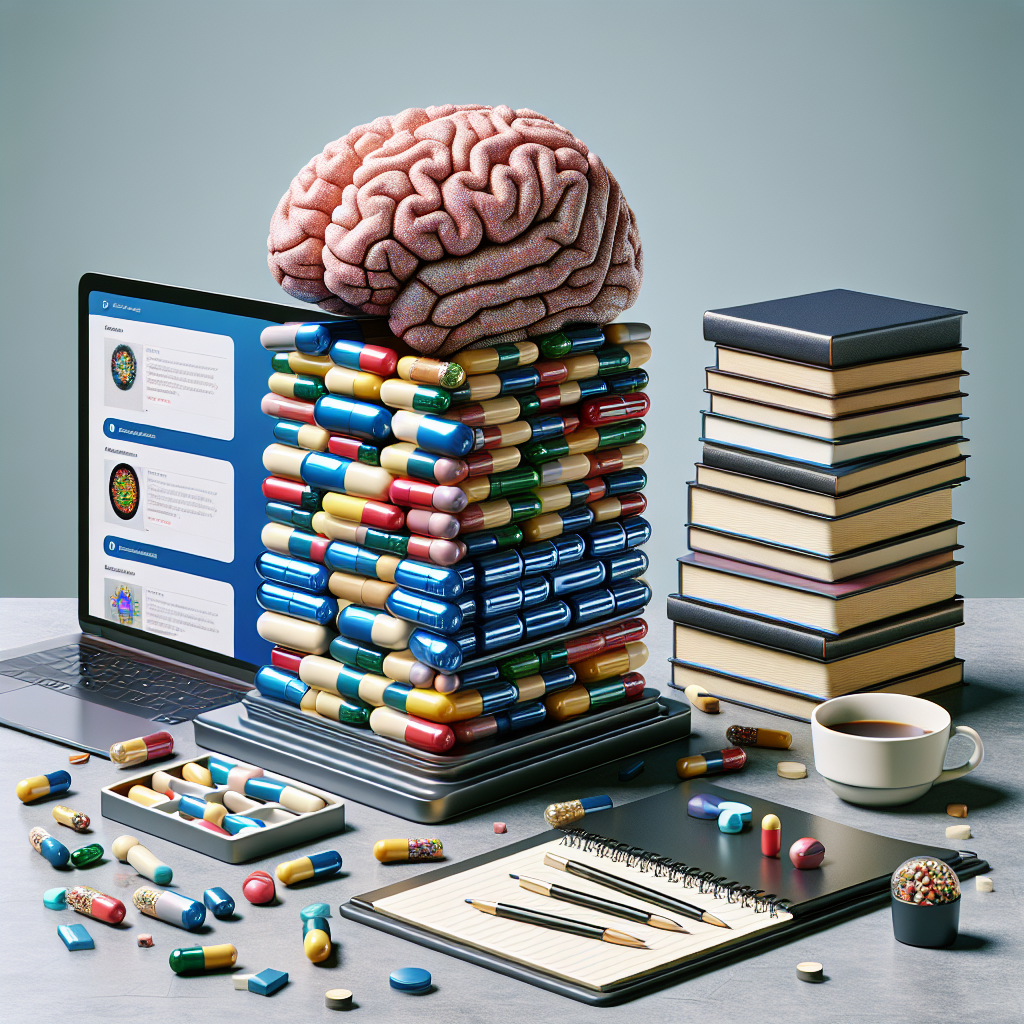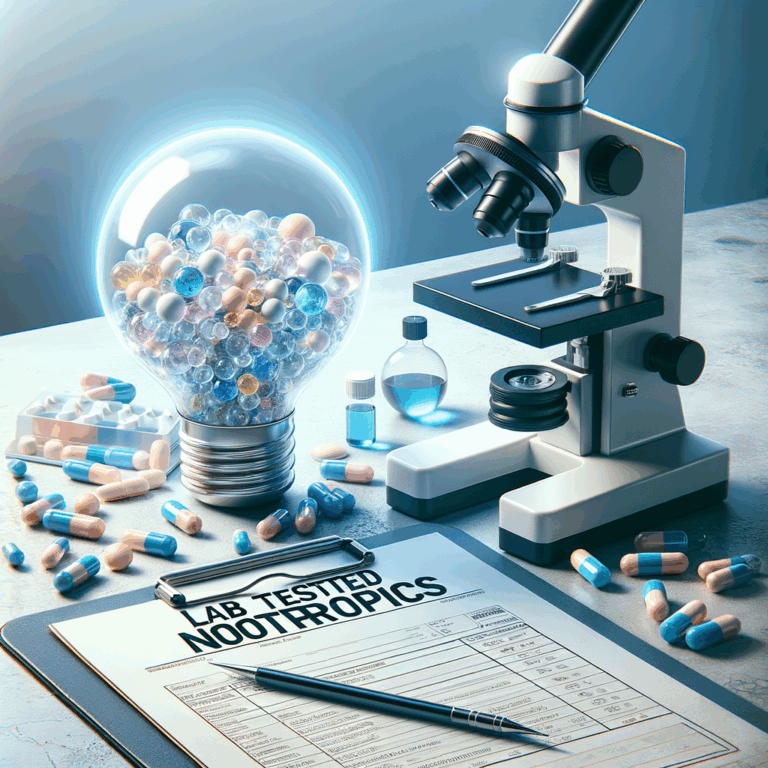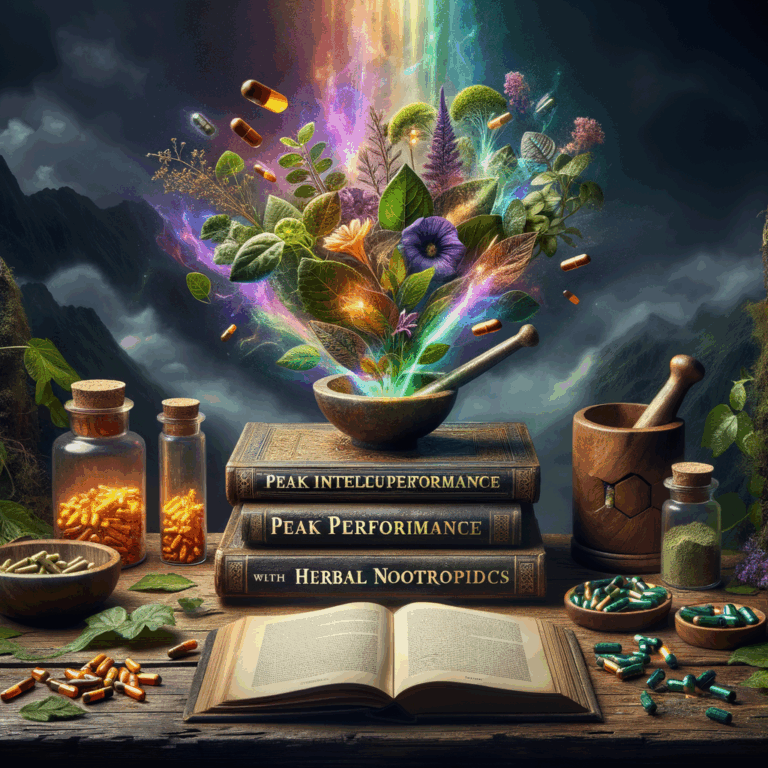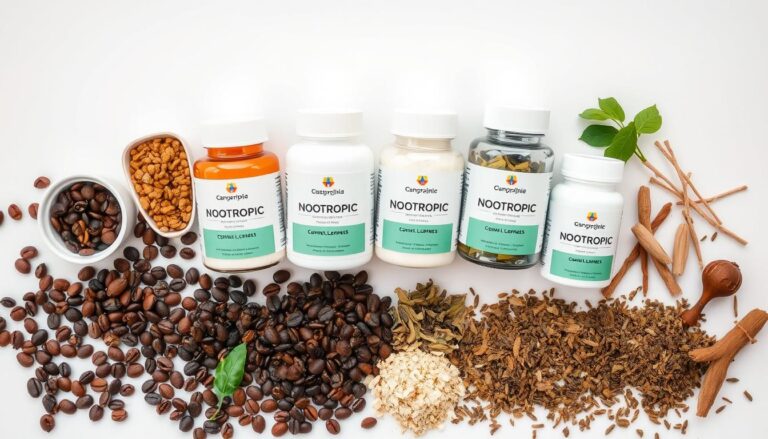
- Understanding Nootropics: What Are They?
- Why Use a Nootropic Stack?
- The Building Blocks of the Best Nootropic Stack
- 1. Caffeine
- 2. L-Theanine
- 3. Bacopa Monnieri
- 4. Rhodiola Rosea
- 5. Lion’s Mane Mushroom
- 6. Alpha-GPC
- How to Create Your Nootropic Stack
- 1. Identify Your Goals
- 2. Research Ingredients
- 3. Start Slowly
- 4. Monitor Your Progress
- 5. Consult a Professional
- Potential Side Effects of Nootropics
- Caffeine
- L-Theanine
- Bacopa Monnieri
- Rhodiola Rosea
- Lion’s Mane Mushroom
- Alpha-GPC
- Popular Nootropic Stacks
- 1. The Classic Focus Stack
- 2. Memory Enhancement Stack
- 3. Stress Reduction Stack
- 4. Comprehensive Cognitive Boost
- The Role of Lifestyle in Cognitive Enhancement
- 1. Sleep
- 2. Nutrition
- 3. Exercise
- 4. Mindfulness and Stress Management
- Conclusion
- FAQs
- 1. Are nootropics safe to use?
- 2. How long does it take to feel the effects of nootropics?
- 3. Can I stack different nootropics?
- 4. Are there any dietary restrictions while taking nootropics?
- 5. Can I use nootropics for exam preparation?
- 6. What if I experience side effects?
- 7. Can I use nootropics daily?
- 8. Are natural nootropics effective?
- 9. Will nootropics improve my intelligence?
- 10. How do I choose the right stack for me?
- References
Understanding Nootropics: What Are They?
Nootropics, often referred to as “smart drugs,” are substances that enhance cognitive function. They can boost memory, creativity, and motivation. The term “nootropic” originally described drugs that improve cognitive functions without causing significant side effects. Today, it includes a wide range of substances, from natural herbal extracts to synthetic compounds.
The increasing complexity of our daily lives demands more mental acuity. This rise in intellectual demands has led many to explore ways to enhance their cognitive abilities. Students, professionals, and anyone eager to learn effectively are searching for solutions. This is where the best nootropic stack comes into play.
A nootropic stack is a combination of different nootropics strategically chosen to maximize their cognitive-enhancing benefits. Individuals aim to create a tailored blend that suits their unique needs, resulting in improved learning and overall cognitive function.
Why Use a Nootropic Stack?
Using a nootropic stack helps target specific areas of cognitive improvement. For example, some may seek enhancements in memory retention, while others might prioritize focus and clarity. A well-rounded stack can address multiple areas simultaneously.
Not only can nootropics support mental clarity, but they can also help reduce anxiety. Many learners report feeling more focused and less overwhelmed when using nootropics. When stress levels drop, learning becomes smoother and more enjoyable.
Additionally, a strategic combination of nootropics can enhance learning speed. In a world where time is precious, maximizing efficiency can lead to remarkable achievements. It’s easy to see why many are turning to these cognitive enhancers for academic and professional success.
The Building Blocks of the Best Nootropic Stack
Creating the best nootropic stack involves carefully selecting components based on your goals. Here’s a run-down of some essential nootropics to consider in your stack:
1. Caffeine
Caffeine is a well-known stimulant found in coffee and tea. It boosts alertness and improves focus. Many learners appreciate its immediate effects. However, moderation is key, as too much caffeine can lead to jitters.
2. L-Theanine
Often paired with caffeine, L-theanine provides a calming effect. This amino acid helps reduce the jitteriness associated with caffeine consumption. It promotes relaxation without drowsiness. A combination of caffeine and L-theanine creates a balanced energy boost, enhancing learning capabilities.
3. Bacopa Monnieri
A powerful herb in traditional medicine, Bacopa Monnieri shows promise in improving memory and cognitive function. Research suggests it may enhance information processing and retention. Regular usage over several weeks typically yields the best results.
4. Rhodiola Rosea
Rhodiola Rosea is an adaptogen that helps combat fatigue and stress. This herb can enhance your ability to cope with mental strain. It improves mood and overall brain function, making it a great addition to any stack.
5. Lion’s Mane Mushroom
Lion’s Mane is gaining popularity for its potential neuroprotective properties. It may promote the production of nerve growth factor, supporting brain health. Users often report increased focus and cognitive clarity.
6. Alpha-GPC
Alpha-GPC is a choline compound that helps support memory and learning. It provides a bioavailable form of choline, which is essential for acetylcholine production. Enhanced acetylcholine levels can improve communication between neurons.
How to Create Your Nootropic Stack
Creating an optimal nootropic stack can seem daunting, but it doesn’t have to be. Here’s a simple guide to help you formulate your blend:
1. Identify Your Goals
Before selecting nootropics, think about what you want to achieve. Are you looking to boost memory, enhance focus, or reduce anxiety? Identifying specific goals will guide your choices.
2. Research Ingredients
Take time to research and understand various nootropics. Look at their effects, potential side effects, and dosages. Scientific literature and user testimonials can offer valuable insights.
3. Start Slowly
When trying a new stack, start with lower dosages. Gradually increase them to find the most effective levels for you. This trial-and-error approach helps minimize potential side effects.
4. Monitor Your Progress
Keep track of your cognitive performance and any side effects. Journaling your experiences can help you adjust your stack effectively. If certain nootropics don’t work for you, feel free to swap them out.
5. Consult a Professional
Before making significant changes to your regimen, consider consulting a healthcare professional. A qualified expert can offer personalized advice tailored to your needs.
Potential Side Effects of Nootropics
While many nootropics are safe, they can still have side effects. Understanding these is essential to use them effectively.
Caffeine
Excessive caffeine can lead to insomnia, headaches, or increased heart rate. To avoid side effects, limit your intake and be mindful of other sources of caffeine.
L-Theanine
L-Theanine is generally regarded as safe. However, it might cause dizziness or headaches in some individuals.
Bacopa Monnieri
Bacopa may lead to digestive issues, such as diarrhea or cramping, in some users. These effects typically lessen over time.
Rhodiola Rosea
Some users may experience irritability or dizziness when using Rhodiola. Start with a lower dosage to gauge your reaction.
Lion’s Mane Mushroom
Lion’s Mane is generally safe but may cause allergic reactions in some individuals. If you notice any adverse effects, discontinue use.
Alpha-GPC
While it is also well-tolerated, some have reported headaches or digestive issues. Monitoring your response can help you adjust dosages.
Popular Nootropic Stacks
Creating the best nootropic stack often involves looking at popular combinations. Here are a few tried-and-true stacks that many people find effective:
1. The Classic Focus Stack
– Caffeine: 100 mg
– L-Theanine: 200 mg
This combination provides balanced energy and focus, making it ideal for studying or work.
2. Memory Enhancement Stack
– Bacopa Monnieri: 300 mg
– Alpha-GPC: 300 mg
This stack supports memory retention and information processing, perfect for learners.
3. Stress Reduction Stack
– Rhodiola Rosea: 200 mg
– L-Theanine: 100 mg
If stress is impacting your learning, this stack helps promote relaxation while maintaining focus.
4. Comprehensive Cognitive Boost
– Caffeine: 100 mg
– L-Theanine: 200 mg
– Bacopa Monnieri: 300 mg
– Lion’s Mane Mushroom: 500 mg
– Alpha-GPC: 300 mg
This robust stack targets multiple cognitive functions. It offers an all-in-one solution for learners looking to excel.
The Role of Lifestyle in Cognitive Enhancement
While nootropics can significantly boost cognitive functions, they work best in conjunction with a healthy lifestyle. Here are some key factors to consider:
1. Sleep
Quality sleep is vital for cognitive health. Aim for 7-9 hours of sleep each night. Good sleep enhances memory and learning abilities, making nootropics even more effective.
2. Nutrition
A balanced diet nourishes your brain and body. Incorporate food rich in omega-3 fatty acids, antioxidants, and vitamins. This complements your nootropic stack and promotes cognitive health.
3. Exercise
Physical activity boosts blood flow to the brain and supports mental health. Aim for at least 30 minutes of moderate exercise a few times a week. Exercise can enhance the effects of nootropics by improving overall brain function.
4. Mindfulness and Stress Management
Practicing mindfulness techniques, such as meditation or deep breathing, can combat stress. Lower stress levels foster a more conducive environment for learning and cognitive enhancement.
Conclusion
The best nootropic stack can be a game-changer for effortless learning success. By understanding each component, setting clear goals, and creating a tailored stack, you can enhance your cognitive abilities. Remember to consider lifestyle factors that can maximize the effectiveness of your stack.
As you embark on your journey into the world of nootropics, stay informed, and listen to your body. Adjust your choices based on personal experiences and goals.
FAQs
1. Are nootropics safe to use?
Generally, yes. Most nootropics are well-tolerated. However, always start with lower doses and consult a healthcare professional if uncertain.
2. How long does it take to feel the effects of nootropics?
Effects can vary. Some users notice changes within hours, while others might take weeks to experience benefits.
3. Can I stack different nootropics?
Absolutely! Many people find that combining nootropics can enhance their effects. Researching and monitoring your reactions is key.
4. Are there any dietary restrictions while taking nootropics?
While there are no strict dietary restrictions, a balanced diet can enhance the effects of nootropics. Aim for nutrient-rich foods.
5. Can I use nootropics for exam preparation?
Yes, many students report improved focus and memory retention while using nootropics during intense study periods.
6. What if I experience side effects?
If you experience side effects, consider reducing the dosage or discontinuing use. Always listen to your body.
7. Can I use nootropics daily?
Some nootropics are safe for daily use, while others might require cycles. Always research individual compounds for best practices.
8. Are natural nootropics effective?
Yes, many natural nootropics have proven benefits for cognitive enhancement. They often come with fewer side effects than synthetic alternatives.
9. Will nootropics improve my intelligence?
Nootropics primarily enhance cognitive functions like memory, focus, and motivation. They typically do not increase innate intelligence.
10. How do I choose the right stack for me?
Assess your cognitive goals and experiment with different combinations. Keep track of your experience and adjust accordingly.
References
– “Nootropic Supplements: A Review of Human Studies,” Healthline
– “Caffeine and Cognitive Performance: An Overview,” PubMed
– “The Efficacy of Bacopa Monnieri: Effects on Memory and Cognition,” ResearchGate
– “Understanding Rhodiola Rosea,” Nutritional Neuroscience
– “Lion’s Mane Mushroom: Benefits and Dosage,” Medical News Today



